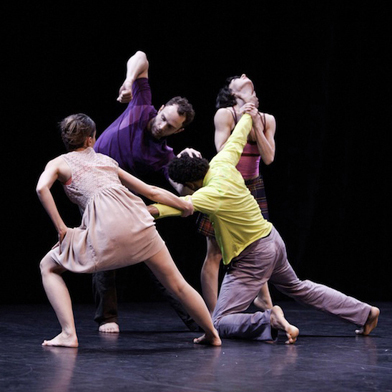Gilles Jobin‘s Spider Galaxies, featuring a Kyma-generated score performed live by Cristian Vogel, is embarking on the next leg of a world tour with performances at:
- May 20 РFestival Evidanse РDel̩mont РSwitzerland
- June 14 – Festival Latitudes Contemporaines – Lille – France
- December 8 & 10 – Festival theater:now – Steckborn – Switzerland

Susanna Panandes Diaz, Isabelle Rigat, Louis-Clement da Costa and Martin Roehrich in a scene from Gilles Jobin's Spider Galaxies
In his May 3rd review of the Beirut performance of Spider Galaxies for L’Orient du Jour, Critic Edgar Davidian wrote:
The music is intense, rhythmic, percussive, and populated by noises of all kinds, from the tuf-tuf of trains and hissing of bullets, sirens roaring or speeding decibels, cries of a tropical forest, or the noises of a bustling city; the dancers are like air traffic controllers giving signals and weaving a web (is that the spider?) by way of gestures and unforeseeable pirouettes, free, impulsive, fantastic, at the same time having often an almost machine-like precision in obeisance to rigor and discipline.
The richness of the sound score is due to two modern composers, Cristian Vogel and above all Carla Scaletti, a pioneer and intrepid avant-gardist of electronic music. Â An amazing score (all the more so in that the steps of the dance fit perfectly with the notes that spring forth from synthesizers and computers) where the sense of melody is deliberately ignored in favor of cadences, of rhythms, and above all strange groupings of sounds like roars, gun shots, deafening landslides, organized noise.
Read the full review in the original French.
In The Daily Star, May 3rd edition, Matthew Mosley wrote:
Some audiences might have seen resonances with the beguiling behavior of subatomic particles when the Gilles Jobin dance troupe came to town Saturday with “Spider Galaxies,†their brand new creation.
With an electronic soundtrack that makes use of data from the LHC, “Spider Galaxies†is an hour-long stream of non-repeating dance sequences performed by a team of four, a continually mutating bodyscape of interaction and divergence that generates an intense hypnotic power.
…
As a subterranean rumble resonated through the Madina’s sound system, algae-hued light revealed dancers Susanna Panandes Diaz, Isabelle Rigat, Louis-Clement da Costa and Martin Roehrich dispersed across the stage.
…
Randomness was built into the soundtrack, too, mixed live by longtime Jobin collaborator Cristian Vogel. At several moments Vogel deployed random number generating programs to dictate the specific texture of the soundscape.
Spread over a number of channels, Vogel’s incidental music blended sampled sounds, electronic melodies and tracks from composer Carla Scaletti, whose pieces incorporated LHC data. The resulting soundtrack veered between Kraftwerk-like electro, industrial clankings and ominous hummings.
At times Vogel [and Scaletti] used multiple speakers to create marvelous Doppler effects, giving audience members the sensation of sitting at the center of the LHC itself, with particles whizzing round at increasing speeds, preparing to impact.
…
Investigating the elusive notions of beauty, meaning and human behavior, Jobin provides us with a reminder, if one were needed, of the essential mysteriousness of the world.
Sorry, the comment form is closed at this time.